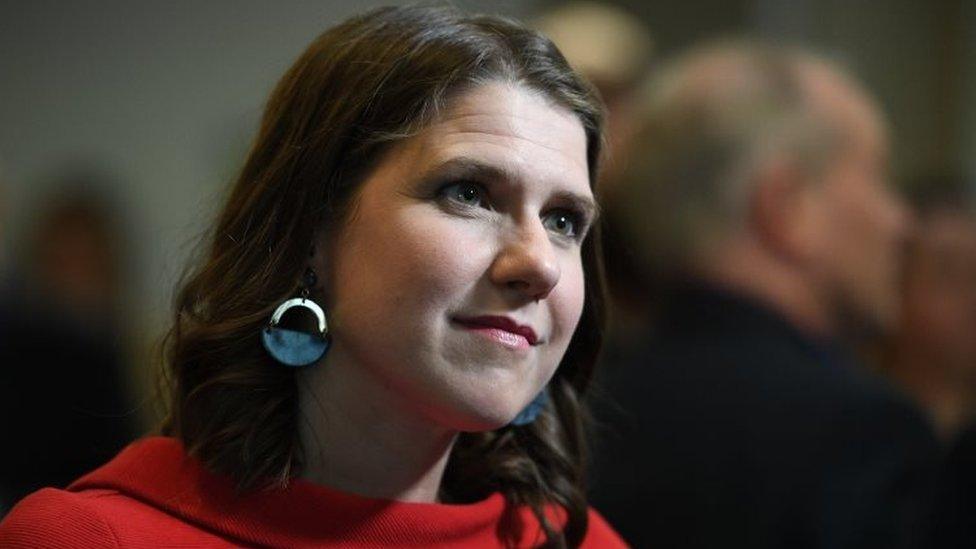Lib Dems: Jo Swinson becomes party's first female leader
- Published
New Lib Dem leader Jo Swinson: "I will do whatever it takes to stop Brexit."
Jo Swinson has become the first female Liberal Democrat leader, after decisively beating Sir Ed Davey in a poll of party members.
She won 47,997 votes, against her opponent's 28,021.
The 39-year old, who succeeds Sir Vince Cable, said she was "over the moon" to have been elected and was "ready for the fight of our lives".
She told activists the UK's future lay in the European Union and she would do "whatever it takes to stop Brexit".
As well as being the first woman to take charge of the party, Ms Swinson is also its youngest ever leader.
Describing Boris Johnson, the frontrunner in the contest to be the next Conservative leader, as "unfit to be prime minister", she said her party was ready to return to government.
"I stand before you today not just as leader of the Lib Dems, but as a candidate to be prime minister. There is no limit for my ambition for our party, our movement and our country.
"I am ready to take my party into a general election and win it."
The BBC's political correspondent Jessica Parker said Ms Swinson's victory speech was met with rapturous applause.
Allow X content?
This article contains content provided by X. We ask for your permission before anything is loaded, as they may be using cookies and other technologies. You may want to read X’s cookie policy, external and privacy policy, external before accepting. To view this content choose ‘accept and continue’.

Allow X content?
This article contains content provided by X. We ask for your permission before anything is loaded, as they may be using cookies and other technologies. You may want to read X’s cookie policy, external and privacy policy, external before accepting. To view this content choose ‘accept and continue’.

Ms Swinson, who has been the party's deputy leader since 2017, was a business minister in the Lib Dem-Conservative coalition government.
Just 25 years old when she was first elected to Parliament in 2005, she regained her East Dunbartonshire seat in the 2017 general election after losing it two years earlier.
She told supporters her party, which came second in the recent European elections on the back of its support for another Brexit referendum, had enjoyed a remarkable turnaround over the last two years and it was clear "liberalism is alive and thriving".
'Working together'
She said the UK's vote to leave the EU marked a "retreat" from the world and a challenge to the "liberal values" and "fundamental freedoms" her party had historically championed.
"We champion freedom - but Brexit will mean the next generation is less free to live, work and love across Europe," she said.
"We value openness - but Britain is in retreat, pulling up the drawbridge."
The party said 72% of its about 106,000 members had voted.
In her victory speech, Ms Swinson appealed to disillusioned Conservative, Labour and independent MPs, saying her "door was always open" to those determined to fight the rise of "nationalism and populism".
"This is the time for working together. This is not the time for tribalism."
In response, a number of former members of Change UK, who have been linked with the Lib Dems since quitting the breakaway party, offered their congratulations.
Allow X content?
This article contains content provided by X. We ask for your permission before anything is loaded, as they may be using cookies and other technologies. You may want to read X’s cookie policy, external and privacy policy, external before accepting. To view this content choose ‘accept and continue’.

Allow X content?
This article contains content provided by X. We ask for your permission before anything is loaded, as they may be using cookies and other technologies. You may want to read X’s cookie policy, external and privacy policy, external before accepting. To view this content choose ‘accept and continue’.

Allow X content?
This article contains content provided by X. We ask for your permission before anything is loaded, as they may be using cookies and other technologies. You may want to read X’s cookie policy, external and privacy policy, external before accepting. To view this content choose ‘accept and continue’.

Speaking at a rally on Monday evening, Sir Ed congratulated his rival on her victory and said the party was "totally united" behind her.
"These are historic times and we are needed more than ever before," he said. "With Boris Johnson about to become prime minister, we need to raise our game even more."

What is Sir Vince Cable's legacy?
By Gavin Stamp, political reporter, BBC News
Expectations were low when Sir Vince became Lib Dem leader in July 2017.
The party was still in the political wilderness after its hammering in the 2015 general election. It hadn't made the progress it had hoped for in 2017's snap poll, and Tim Farron had quit suddenly as leader amid uncomfortable questions over his views on faith and homosexuality.
MPs weren't exactly queuing up to replace Mr Farron - Sir Vince was elected unopposed. He inherited a party that seemed to be going nowhere, fast.
Almost two years later, the picture couldn't be more different. His successor takes over a party with a real spring in its step and genuine optimism about the future.
So how did the turnaround happen and how much credit should the outgoing leader get for it?

- Published22 July 2019
